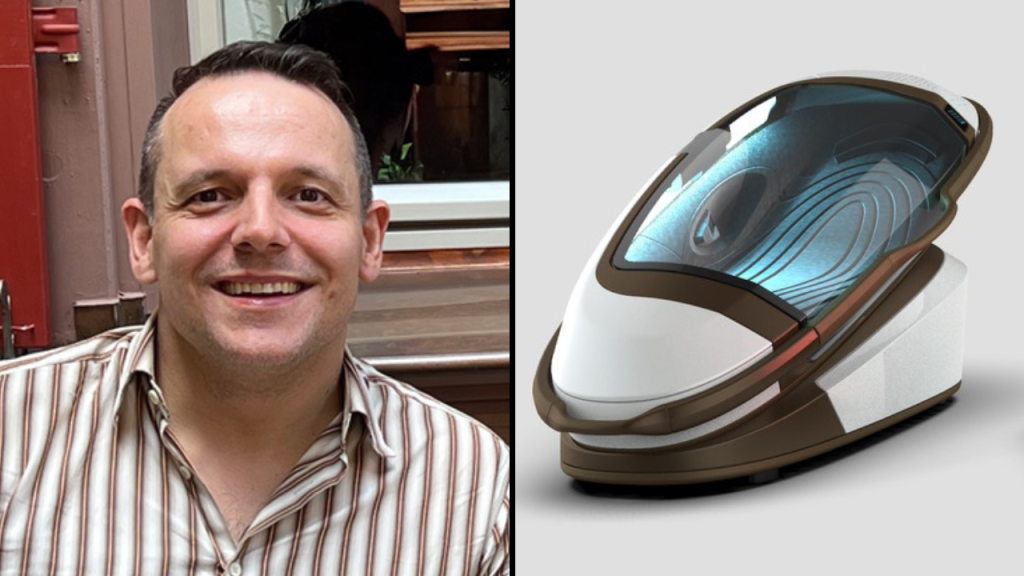
The creator of the controversial ‘euthanasia pod‘ has broken his silence after its first user was found dead with ‘strangulation marks.’
The Sarco pod has drawn significant attention as a new approach to assisted dying, sparking debates over ethics, legality, and the implications of technology in end-of-life decisions.
Developed by Dr. Philip Nitschke, the founder of the pro-euthanasia group Exit International, the Sarco is a 3D-printed capsule that allows individuals to take control of their own death without medical intervention.
The device introduces nitrogen gas into its sealed chamber, rapidly reducing oxygen levels and causing death within minutes through hypoxia and hypocapnia, conditions that deprive the body of oxygen and carbon dioxide.

Users of the Sarco pod must enter the device and answer three verbal questions: “Who are you?” “Where are you?” and “Do you know what happens if you press the button?”
Upon verification of these responses, the pod is activated, and the user presses a button to release the nitrogen.
Dr. Nitschke describes the experience as painless, with the user experiencing slight disorientation or euphoria before losing consciousness, leading to death within 30 seconds.
He emphasizes that the process eliminates the need for medical supervision, aligning with his goal to ‘de-medicalize the dying process.’
But the Sarco pod has faced significant scrutiny. In Switzerland, where assisted suicide is legal under strict regulations, the pod’s classification remains a matter of debate.
Legal expert Dr. Daniel Huerlimann argues that the Sarco is not a medical device and therefore not subject to regulation under Swiss medical laws.
However, Dr. Kerstin Noelle Vkinger contends that all products, including non-medical devices, must adhere to safety standards.
Critics also warn that the pod’s sleek, modern design could ‘glamorize’ suicide, trivializing the gravity of such decisions and raising ethical concerns about its potential misuse.

In September 2024, the Sarco pod was reportedly used for the first time, leading to a highly controversial incident.
A 64-year-old American woman suffering from skull base osteomyelitis, a rare and painful condition, chose to end her life using the device in a secluded forest near a cabin in Merishausen, Switzerland.
Unable to receive effective treatment due to an immune disorder, she had expressed a desire to die for over two years.
The procedure, overseen remotely by Dr. Nitschke via video call, raised serious concerns and resulted in multiple arrests, including Dr. Florian Willet, president of The Last Resort, the Sarco operator.
Swiss authorities reported inconsistencies during the procedure, per LBC.
Witnesses noted that the pod was opened and closed multiple times before activation, and forensic experts discovered strangulation marks on the woman’s neck, inconsistent with the pod’s mechanism.
Six minutes after the button was pressed, Dr. Willet reportedly exclaimed: “She’s still alive, Philip,” raising suspicions about the effectiveness of the process.
Prosecutor Peter Sticher has suggested the possibility of intentional homicide, although Willet has not been formally charged, the BBC reports.
Authorities have since suspended all 371 pending applications for the Sarco pod as the investigation continues.

The incident has reignited debates about assisted dying and the ethical implications of autonomous devices like the Sarco pod.
While advocates argue it provides dignity and control to those seeking to end their suffering, critics fear it could undermine safeguards and normalize suicide.
In Switzerland, a country with permissive assisted dying laws, the pod’s operation without medical supervision has heightened concerns about safety and oversight.
If you or someone you know is affected by any of the issues raised in this story, call the National S**cide Prevention Lifeline in the U.S.A. at 800-273-TALK (8255) or text Crisis Text Line at 741741.
In the U.K., the Samaritans are available 24/7 if you need to talk. You can contact them for free by calling 116 123, emailing jo@samaritans.org, or heading to the website to find your nearest branch.
Related Article: Death Row Inmate Who Survived 18 Lethal Injections Ended Up Dying Of Something Completely Different
Related Article: Heartbreaking Final Wish Of Physically Healthy 29-Year-Old Who Died By Euthanasia



